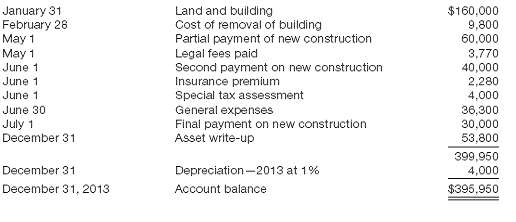Spitfire Company was incorporated on January 2, 2013, but was unable to begin manufacturing activities until July
Question:
Spitfire Company was incorporated on January 2, 2013, but was unable to begin manufacturing activities until July 1, 2013, because new factory facilities were not completed until that date.The Land and Building account reported the following items during 2013.

The following additional information is to be considered.1. To acquire land and building, the company paid $80,000 cash and 800 shares of its 8% cumulative preferred stock, par value $100 per share. Fair value of the stock is $117 per share.2. Cost of removal of old buildings amounted to $9,800, and the demolition company retained all materials of the building. 3. Legal fees covered the following.Cost of organization $ 610Examination of title covering purchase of land 1,300Legal work in connection with construction contract 1,860 $3,7704. Insurance premium covered the building for a 2-year term beginning May 1, 2013.5. The special tax assessment covered street improvements that are permanent in nature.6. General expenses covered the following for the period from January 2, 2013, to June 30, 2013.President??s salary $32,100Plant superintendent??s salary??supervision of new building 4,200$36,3007. Because of a general increase in construction costs after entering into the building contract, the board of directors increased the value of the building $53,800, believing that such an increase was justified to reflect the current market at the time the building was completed. Retained earnings was credited for this amount.8. Estimated life of building??50 years.Depreciation for 2013??1% of asset value (1% of $400,000, or $4,000).Instructions(a) Prepare entries to reflect correct land, building, and depreciation accounts at December 31, 2013.(b) Show the proper presentation of land, building, and depreciation on the balance sheet at December 31,2013.
Balance SheetBalance sheet is a statement of the financial position of a business that list all the assets, liabilities, and owner’s equity and shareholder’s equity at a particular point of time. A balance sheet is also called as a “statement of financial... Par Value
Par value is the face value of a bond. Par value is important for a bond or fixed-income instrument because it determines its maturity value as well as the dollar value of coupon payments. The market price of a bond may be above or below par,...
Step by Step Answer:






